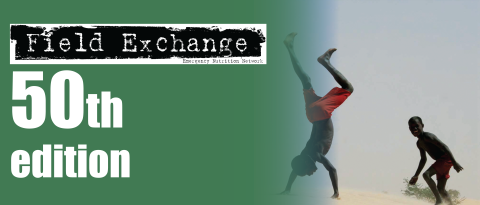Summary of Nutrition Exchange user survey findings
 In April - May 2015, an evaluation of the ENN’s publication, Nutrition Exchange, was conducted through an online survey. Nutrition Exchange is an annual publication produced in three languages (English, French and Arabic) in print and e-copy. It targets those working in the nutrition and related sectors at national level and features both original content and summarised Field Exchange and other material. Key findings are presented here.
In April - May 2015, an evaluation of the ENN’s publication, Nutrition Exchange, was conducted through an online survey. Nutrition Exchange is an annual publication produced in three languages (English, French and Arabic) in print and e-copy. It targets those working in the nutrition and related sectors at national level and features both original content and summarised Field Exchange and other material. Key findings are presented here.
Where are our readers located?
A total of 159 respondents completed the survey. Of the 136 respondents who indicated which country they were working in, most were in Africa (65%) while others were working in North America/Europe (14%), Asia (13%), Middle East (5%) and South America/Caribbean (1%). In response to what type of organisation they work for, 32% (of 138 respondents) were working with international non-governmental organisations (NGOs), 15% government, 12% United Nations (UN) agencies, 11% academic institutions and 8% local NGOs. Others were independent consultants/self-employed (7%), students (5%) or were working with civil society/private sector (4%).
Use of Nutrition Exchange
Respondents primarily use Nutrition Exchange for personal learning (68% of 140 respondents); to keep up to date with news (54%) and research (46%); and to understand how other agencies are dealing with challenges or programming in specific contexts (32%). Nutrition Exchange is also shared and used to build capacity of staff and local partners.
"I have adopted a number of research ideas from other countries (shared in Nutrition Exchange) and contextualised them to my own current programming" Local NGO worker
Interest of readers
All types of Nutrition Exchange content (programming experiences, research and news/events) were identified as valuable (140 respondents). Respondents suggested that additional information on the following topics would be useful: infant and young child feeding (IYCF) including complementary feeding; stunting prevention; nutrition programmes for adolescents, adults and the elderly; and experiences from governments on mainstreaming nutrition at policy level.
"We use Nutrition Exchange to inform our practices and the progarmmes we implement." INGO worker
Contributing to Nutrition Exchange
Sixteen per cent of 140 respondents have contributed to an article published in Nutrition Exchange. Respondents reported the following benefits from writing up their experiences for publication: sharing their experiences more widely thought the publication; improving their writing skills; and increased visibility of their organisation and its work. For respondents that have not contributed to Nutrition Exchange, the main reasons (reported by 112 respondents) why they have not were that they were unsure of the process; had no time; were unsure if their experiences are valuable to others; and lack of of confidence in their own writing skills. ?
Access and reading preferences
Half of the respondents received print copies and half received only electronic copies of the publication. Many receiving only an electronic copy did not know it was possible to receive a print copy. Regarding preferred frequency of the publication, more than half of survey respondents (54% of 129 respondents) were happy with an annual publication while 45% requested more frequent publication, the majority suggesting twice a year or quarterly publications. Regarding how respondents would like to receive information from the ENN in the future, 76% (of 123 respondents) requested regular news updates via email from ENN, 54% were interested in keeping up to date via the ENN website while 12% expressed interest in receiving news via Facebook.
Overall a majority of respondents (95% of 129 respondents) were satisfied with the publication. Suggestions for improving the publication included increasing contributions from government staff and more information on nutrition in development contexts.?
A word from the Nutrition Exchange editorial team
Nutrition Exchange aims to be a publication written by national actors for national actors so we are pleased to see this re-emphasised in this survey. Please encourage those working in government and in civil society organisations to get in touch with us about writing up their experiences of nutrition programming.
The editors have developed a short guide on how to publish a short article in Nutrition Exchange, available at http://www.ennonline.net/subscribe/Nutrition Exchange or contact the editorial team who will support you to write an article via valerie@ennonline.net.
Summaries of published research and programmes on the topics identified in the evaluation will be prioritised for the Nutrition Exchanget issue. Additionally, a call for readers’ experiences and learning around these topics will be issued later this year.
Currently, ENN funding is for an annual publication of Nutrition Exchange. However, in 2016, ENN is likely to be producing Nutrition Exchange twice per year. We will also explore other ways to capture and disseminate learning and will notify our readers of new developments. Please view ENN’s newsroom for continual updates in the sector.
To receive a free print copy of the Nutrition Exchanget issue, please register here.


